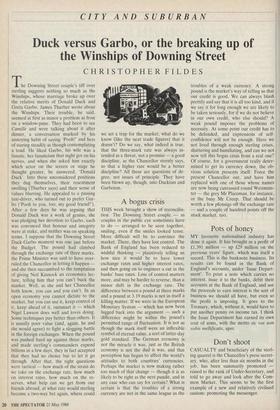CITY AND SUBURBAN
Duck versus Garbo, or the breaking up of the Winships of Downing Street
CHRISTOPHER FILD ES
The Downing Street couple's tiff over sterling suggests nothing so much as the Winships, whose marriage broke up over the relative merits of Donald Duck and Greta Garbo. James Thurber wrote about the Winships. Their trouble, he said, seemed at first as minor a problem as frost on a window-pane. They had been to see Camille and were talking about it after dinner, a conversation marked by his annoying habit of saying 'Pooh!' and hers of staring steadily as though contemplating a toad. He liked Garbo, his wife was a fanatic, her fanaticism that night got on his nerves, and when she asked him exactly which actor on the screen or stage he thought greater, he answered, 'Donald Duck'. Into these unconsidered positions they dug themselves, their resentment swelling (Thurber says) and their sense of values blurring. He appealed to a passing taxi-driver, who turned out to prefer Gar- bo (Pooh to you, too, my good friend!'). After a few days he was arguing that Donald Duck was a work of genius, she was pledging her devotion to Garbo, each was convinced that honour and integrity were at stake, and neither was on speaking terms. I suppose that the Downing Street Duck-Garbo moment was one just before the Budget. The pound had climbed through the exchange rate of three marks, the Prime Minister was said to have over- ruled the Chancellor in letting it happen and she then succumbed to the temptation of giving Neil Kinnock an economics lec- ture, telling him that you can't buck the market. Well, as she and her Chancellor both know, you can and you can't. In an open economy you cannot dictate to the market, but you can use it, keep control of it, keep ahead of it, outsmart it — which Nigel Lawson does well and loves doing. Some techniques pay better than others. It is usually poor value (and, again, he and she would agree) to fight a slogging battle in the foreign exchanges. When the pound was pushed hard up against three marks, and made sterling's commanders expend billions in a few days, they in fact accepted that they had no choice but to let it go through. After that, the right questions were tactical — how much of the strain do we take on the exchange rate, how much on interest rates, how much on the re- serves, what help can we get from our friends abroad, at what rate would sterling become a two-way bet again, where could
we set a trap for the market, what do we know (like the next trade figures) that it doesn't? Do we say, what indeed is true, that the three-mark rate was always in- tended as a threat, not a promise — a good discipline, as the Chancellor sternly says, so that a higher rate would be a better discipline? All these are questions of de- gree, not issues of principle. They have been blown up, though, into Duckism and Garboism.






























































 Previous page
Previous page